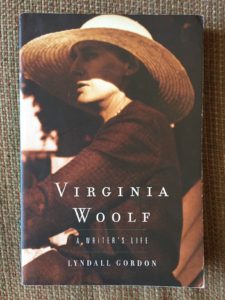Lyndall Gordon writes in the acknowledgements section of her biography of Virginia Woolf, “A new life would be superfluous if, with undue modesty, [Quentin Bell] had not declined to assess her writing.” This is exactly what impelled me to find additional biographical reading, even though Bell’s portrait of his aunt is clearly drawn and satisfying. My reading of Nabokov twenty years ago was supported superbly by Brian Boyd’s critical biography, and I had assumed that there would be two if not three excellent equivalents in the case of Virginia Woolf. But it is not as simple – nothing in Bloomsbury, I now see, is at all simple. However, Nigel Nicolson’s biography is concise, and so far, is eminently readable. He writes from a distance only slightly greater than Bell’s, being the son of VW’s lover and friend Vita Sackville-West. I did expect it to be more of a tome, but it is very small. One little coincidence is worth noting, that Nicolson was the British publisher of Lolita.
Both Quentin Bell and Lyndall Gordon won the James Tait Black Memorial Prize for their efforts. A too-quick glance reveals that only Queen Victoria is also the subject of two winning biographies, one of course written by Lytton Strachey. Virginia Woolf’s father Sir Leslie Stephen is also the subject of an award-winning life on the list. Other VW-connected prize winners are G.M. Trevelyan, Lord David Cecil, Geoffrey Keynes, and H.A.L. Fisher. Before this expedition, I wouldn’t have noticed them as a set, and while E.M. Forster would have stood out among the fiction prizewinners, Bunny Garnett would not. And speaking of the latter, there is a letter VW wrote in 1915 to Duncan Grant, shortly after she recovered from a serious bout of illness, that introduces him to the name David Garnett. Is there a name for when a reader sees a little seed of fate that the writer could not possibly imagine? It’s not serendipity – some form of irony? And then there is the panopticon that one wishes to create out of all their letters and memoirs.
Post script: I couldn’t resist adding The Bloomsbury Group by Frances Spalding to the mix. This is the danger of working in a well-stocked university library. I’m saving her work on Duncan Grant for some future time. His art, and that of Vanessa Bell, have begun to draw me in to what is, but should not be, the less visible legacy of Bloomsbury.

Right brain, left brain: Duncan Grant and Maynard Keynes in 1913.

